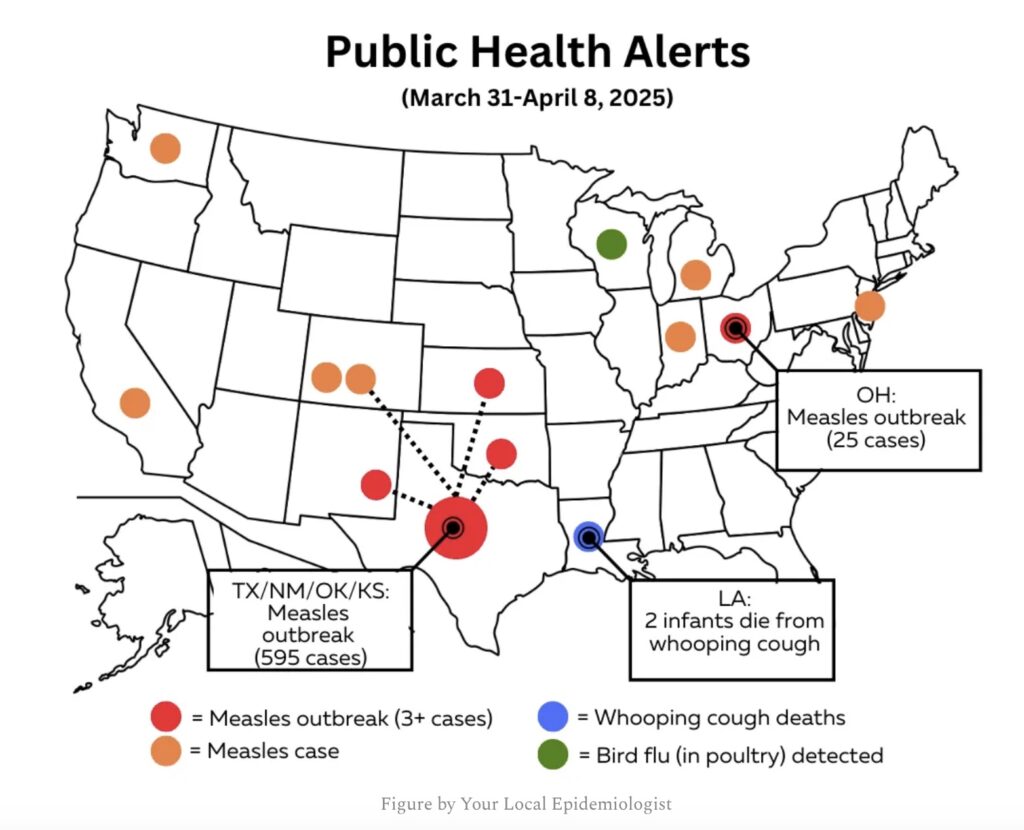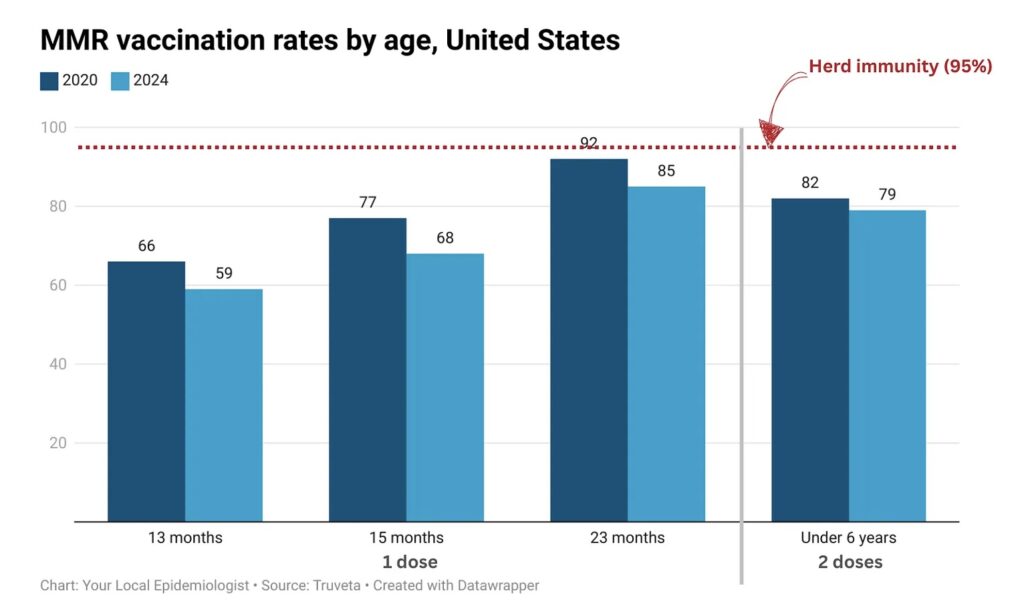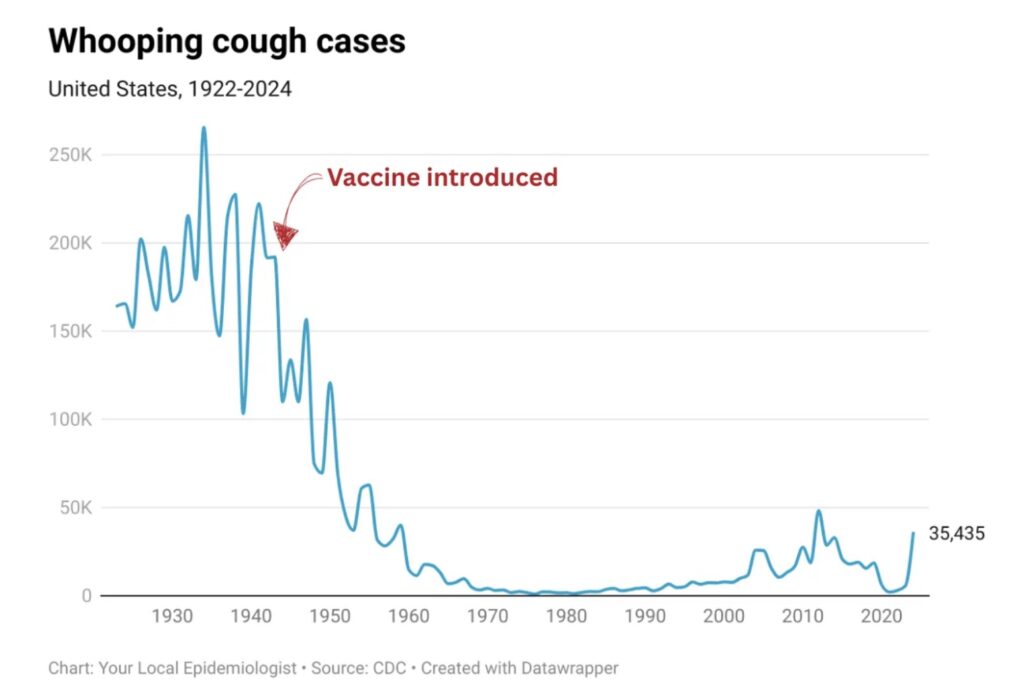It’s Public Health Week! Send a note to your local health department. Many folks in public health will tell you: this moment is even harder than the Covid-19 emergency (which is really saying something).
Here’s what’s happening in the world of health, what it means for you, what you can do about it—and yes, some hope.
Let’s start with some hope because I need it.
As feared, pulling the plug on public health infrastructure funding overnight is already having consequences. A few examples:
- Milwaukee: The CDC response team halted work on addressing lead paint in schools.
- Dallas, TX canceled MMR vaccination clinics.
- A North Carolina study on post-Hurricane Helene health impacts was canceled.
But these cuts are being met with resistance:
- Twenty-three state Attorneys General have filed a lawsuit to stop the $11 billion rollback in HHS funding. That buys local health departments at least 14 more days of spending authority.
- The U.S. Senate Health Committee has invited RFK Jr. to testify about the cuts and his vision for public health this week. (Note: it’s just an invite—he doesn’t have to attend. We’ll see.)
- RFK Jr. said some programs were cut “by mistake,” including the Childhood Lead Poisoning Prevention Program—and he may reinstate it. That might be a smokescreen, but I’m choosing to hope that some version of this critical work continues (even if not through CDC).
- A federal judge has permanently barred NIH from cutting “indirect costs” to universities and academic medical centers. This is the money the federal government gives to researchers to “keep the lights on” at research labs (Here is a YLE explainer). Of course, the administration is going to appeal this decision. But for now, this restores billions of dollars in grant money to medical research.
Some good news: Shingles vaccine may lower dementia risk
Dementia rates are decreasing for reasons not known. In a solid (cough cough, federally funded) study published last week, scientists found that women who received the shingles vaccine were 20% less likely to develop dementia. That’s pretty incredible.
The science here is fascinating. We’re learning that some viruses may hang out in our bodies for years or even decades, quietly damaging the brain. Dr. Jenn Dowd has a great explainer for a deeper dive into this study.
Who should get the shingles vaccine?
- Adults ages 50+
- Anyone 18+ who is immunocompromised
Note: It doesn’t matter whether you’ve had shingles or chickenpox before.
More good news: Respiratory season is winding down
Flu season is mostly over, so we’re pausing weekly updates for now. Covid-19 trends are still heading downward nationally, though we’re keeping a close eye on them.
Measles: Still spreading, despite RFK Jr. talking points
Earlier this week, RFK Jr. claimed that measles cases had “flattened,” prompting CDC to pull their response team from West Texas. Then a measles-related death was reported—and the team was sent back.
Cases are still rising (not flattening). As of this morning, the tally is 675 across the country. The largest outbreak remains in West Texas (505 cases), now spreading toNew Mexico (56), Kansas (25), Oklahoma (10), and Mexico (100+). Colorado now has an infant case after traveling to Mexico (so, technically, this case is tied to the West Texas outbreak; genetic testing needs to be done to make the link official).
There’s also an unrelated outbreak in Ohio, which is exploding (10 cases last week, 25 cases today.)

New sporadic cases from international travel in the past week include:
- California: adult in Coachella Valley
- Michigan: a case in Macomb County and another reported in Kent County
- Washington: Snohomish County Health Department reported an infected infant after international travel
- Colorado: adult case
- New Jersey: non-resident had measles while traveling through the state (check out more details from YLE NY)
- Indiana: unvaccinated minor in Allen County
For more details on the outbreaks, below is the latest SITREP report (as of last night) from students at the Yale School of Public Health:
Ysph Vmoc Special Report Measles Outbreak Southwest Us 4 8 2025 Final Ver4 1.23MB ∙ PDF file Download
What does it mean for you? If you and your family are vaccinated, you’re well-protected.
If you live near an outbreak—or have a child under 12 months, are immunocompromised, or unvaccinated—keep an eye on local health alerts.
Will measles become the new normal? It’s likely.
New data show MMR vaccination coverage is slipping more than we thought.
Until now, we’ve relied on two CDC surveys—one for kindergartners, one for kids under 3—but they’re delayed and a bit outdated. A new analysis using health records from over 1.1 million children paints a clearer (and more concerning) picture:
- 30% of kids aren’t getting their first MMR dose on time (by 15 months)
- On-time coverage has dropped from 77% (2020) to 69% (2024)
- Even after two years, 15% of kids still haven’t gotten their first dose
There are limitations—health records don’t capture all kids, especially those without regular healthcare visits—but if anything, these numbers may overestimate actual coverage.

What’s the bottom line? We will see an increasing number of measles cases. There’s a good chance we will lose our elimination status, and measles will become endemic. If you’re up to date on vaccines, there is very little risk to you.
Two preventable whooping cough deaths
Louisiana announced that two infants have died from whooping cough—another vaccine-preventable illness. Infants under 1 are at the greatest risk of serious illness or death because their immune systems are still developing.
For context, there were 10 whooping cough deaths last year—so this isn’t too unusual. But it is preventable. Cases continue to rise since the mid-2000s.

What does it mean for you? Make sure you/your kids are up to date on DTaP.
DTaP vaccine is recommended starting at 2 months of age, with booster doses to follow.
Adults in close contact with infants should be up to date on boosters.
Pregnant people should get vaccinated during the third trimester.
RFK Jr. is now targeting fluoride
Dental caries (tooth decay) remains the most prevalent chronic disease among children. Yet, as part of his “Make America Healthy Again” tour, RFK Jr. praised Utah for banning fluoride and said he plans to instruct the CDC to stop recommending it.
A few important reminders:
- The CDC doesn’t mandate fluoride (or vaccines). It provides evidence-based guidance developed with outside experts.
- The CDC task force has recommended community water fluoridation since 2001.
- The CDC’s oral health team was fired last week—so it’s unclear who he’d even be instructing.
- In no coincidence, Geier (yes, the guy who is now leading an autism/vaccine study for RFK Jr.) published a new paper this week questioning fluoride’s safety.
What does it mean for you? You can still check your local fluoridation status on CDC’s tool (while it’s still online). I also suggest engaging with your representatives. Here is a YLE explainer to help ground the conversation in evidence. Yale School of Public Health also has a good explainer.
Bottom line
You’re all caught up! Phew. Stay healthy out there.
(To subscribe to YLE Newsletter, visit https://yourlocalepidemiologist.substack.com/p/threats-to-public-health-at-every?utm_campaign=email-half-post&r=38kt4q&utm_source=substack&utm_medium=email)
Disclaimer: The opinions and views expressed in this article/column are those of the author(s) and do not necessarily reflect the views or positions of South Asian Herald.


![Katelyn 32[2].jpg](https://southasianherald.com/wp-content/uploads/2025/03/Katelyn-322.jpg-1-1170x780.jpeg)


